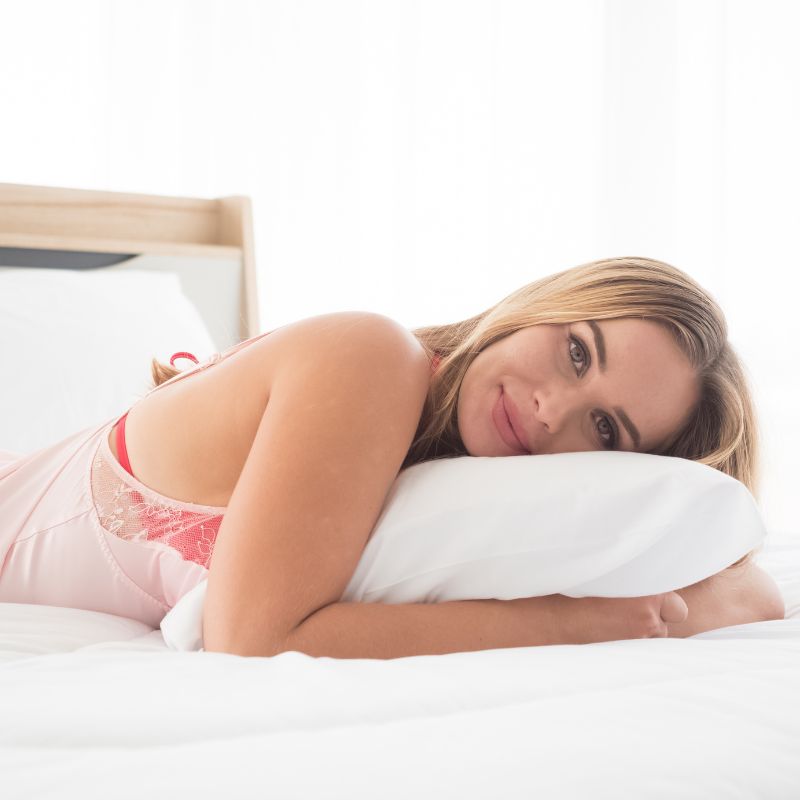It’s unsurprising that 35% of Americans experience less than the recommended dose of seven hours of sleep. Especially when you consider our busy lives, crammed work schedules, and the fact that for the past year the line between work and home has become increasingly blurred. (You know, those important virtual work meetings that probably involved the kitchen table and some element of pajamas from the waist down.)
It also doesn’t help that on top of being over-stressed and under-valued, we constantly find ourselves hooked to blue light emitting screens which keeps our brains wired—no pun intended—whether we like it or not.
Often the solution presented to us is more sleep, which seems to intuitively make sense. After all, how many times have you been jerked awake to the sound of your alarm, and been tempted to hit snooze, wishing for just five more minutes?
Even if you do sneak in a little bit more shut-eye, you’re all too aware that you could be making coffee or getting a headstart on getting ready, that those moments of stolen sleep hardly feel restful. But what this experience teaches us is that just any old sleep isn’t guaranteed to give us the relaxing benefits we seek. In fact, within the last few years, researchers have concluded that quality of sleep is just as important, if not more, than quantity of sleep.

“Great!” You might be thinking to yourself, “so not only do I have to make more time for sleep, but now I have to totally rethink my sleep routine.” But not so fast!
What these same researchers have found is that if you’re receiving quality sleep, then you can afford to skimp on a few hours. Rather than the oft-repeated claim of 7-8 hours, 5-6 hours can actually be more beneficial, if its deep/uninterrupted sleep. Feel more rested and have more time to conquer the day?? Where do we sign up!
Now there’s a few different ways that these researchers have been able to evaluate quality of sleep. For example: is the individual able to fall asleep within thirty minutes? Do they spend at least 85% of the time fast asleep, and do they wake no more than a single period of twenty minutes or less?
With all these factors met, the individual should be experiencing “quality” sleep. To use an analogy, it only takes about an hour to fully charge most phones, however many of us are likely to leave our phones plugged in for much longer (especially at night.) With added plugged-in time, the phone doesn’t gain additional charge, and in fact you could be damaging your battery with all that unnecessary charging!
So what are some ways that you can improve your sleep hygiene so that you can max out on the benefits of sleep? It’s generally recommended that you monitor and limit your consumption of caffeine, sugar and alcohol before bed, as this can cause tossing and turning later on. Ever get a post-dinner rush of energy after coffee and dessert?
Introducing thirty minutes of exercise can also get rid of excess energy, making it easier to wind down later. Finally, and perhaps most importantly, it’s essential that you establish a consistent routine just leading up to bed. Think sensory escape. Soothing smells and light, cozy fabrics and textures. For this, consider Blissy your one-stop shop.

First, to set the vibe, we offer a soothing Lavender-Eucalyptus Sleep & Pillow Mist, so that you can reap those aromatherapy benefits like a mellowed state and improved respiratory function. Safe even for sensitive groups! Then consider tying back those locks with a Blissy silk scrunchie, perfect for maintaining style and texture while giving your hair a rest. Protect your eyes from environmental light pollution, and slip on one of our silk sleep masks! And as you hit lights out, sink into our beloved bestseller, the famous Blissy silk pillowcase.
Let us elevate your sleep routine from A to Z, and notice the difference when you wake up glowing and refreshed, like you just slipped away to a five-star resort for the night. Commit to relaxation and let Blissy do the rest.
















































